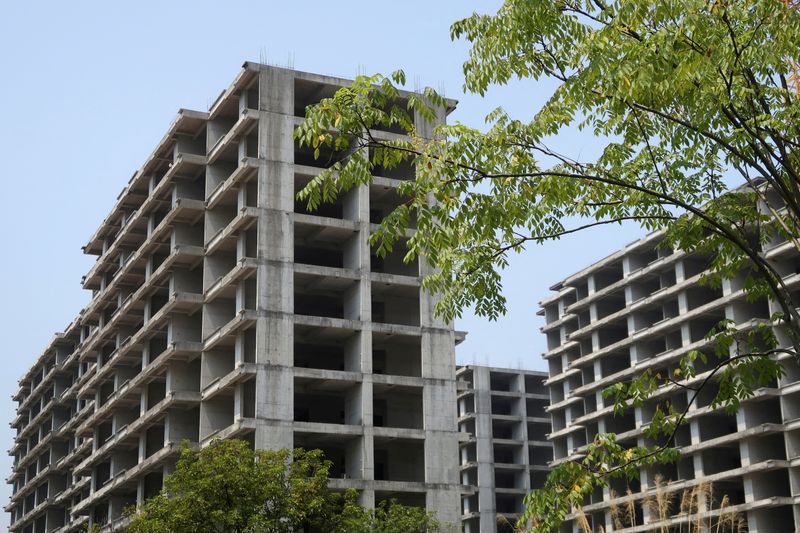By Julie Zhu, Engen Tham and Jing Xu
HONG KONG/SHANGHAI/BEIJING (Reuters) -China has ordered its top four state-owned banks to issue offshore loans to help developers repay overseas debt, three people with knowledge of the matter told Reuters, in Beijing's latest support measure for the cash-starved property sector.
The regulators have given the banks 'window guidance', or verbal orders that leave no paper trail, setting a date of Dec. 10 by which to make loans secured against domestic assets, said two of the sources, who all spoke on condition of anonymity.
China has stepped up support in recent weeks to undo a liquidity squeeze that has stifled the sector, which makes up a quarter of the world's second-largest economy and has been a key driver of growth.
A growing list of developers has defaulted on overseas creditor obligations over the past year, prompting some analysts to warn that such disruptions could blunt foreign investors' appetite for fresh debt issuance by Chinese companies.
Now a debt maturity wall looms for developers, with $39 billion of debt set to mature in the first quarter of next year, and $10 billion of that is denominated in dollars, Refinitiv data shows.
Funds flowing from banks will allow developers to repay offshore loans and dollar bonds, helping to repair global investors' bruised confidence, two of the sources said.
Developers will qualify if their balance sheets are seen as being of "good quality", such as CIFI Holdings, Country Garden, Longfor Group, Midea Real Estate and Seazen Group, one source said.
Each of the four banks, Bank of China, China Construction Bank (OTC:CICHF), Industrial and Commercial Bank of China and Agricultural Bank of China (OTC:ACGBF), will pick several developers to fund, the three sources said.
Each bank will process three to four offshore loan proposals that will be secured against developers' assets in China, said two of the sources, adding that Beijing would expand the scheme later by adding banks.
The third source said that, while the big four banks preferred fresh lending to go to state-backed developers, they would have to include some private firms, which have a greater need for offshore loans.
The People's Bank of China, the central bank, and the China Banking and Insurance Regulatory Commission (CBIRC) did not immediately respond to Reuters' requests for comment.
The big four banks did not respond to requests for comment, nor did representatives of CIFI, Country Garden, Longfor, Midea Real Estate and Seazen.
SUPPORT MEASURES
Beijing's aggressive support for the property sector represents a retreat from a crackdown begun in 2020, targeting speculators and indebted developers in a bid to reduce financial risk.
Chinese banks make offshore loans secured against domestic assets to companies that need foreign funds, but regulatory tightening in the last couple of years to rein in debt-fuelled empire-building by corporates hampered that kind of lending.
Cash-strapped developers have been struggling to tap sources of fresh funding to finish building apartments and repay suppliers and overseas debt, while home demand has crumbled in the face of stringent, lengthy COVID-19 curbs.
Risks to the stability of the financial system are growing on the continuing sluggishness of the property sector and an economic slowdown, making smaller banks more vulnerable, rating agency Moody's (NYSE:MCO) has warned.
Last week, China's biggest banks pledged credit of at least $162 billion to developers.

The new move comes as some foreign bondholders are scouting for property bargains after the recent weeks' slew of support, but the uncertain outlook for home demand is keeping others on the sidelines.
China's central bank will also offer cheap loans to financial firms to buy bonds issued by property developers, separate sources have told Reuters.